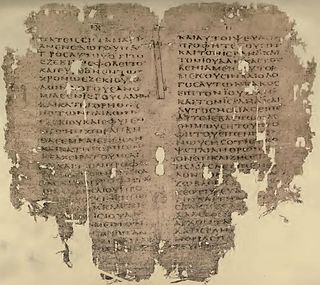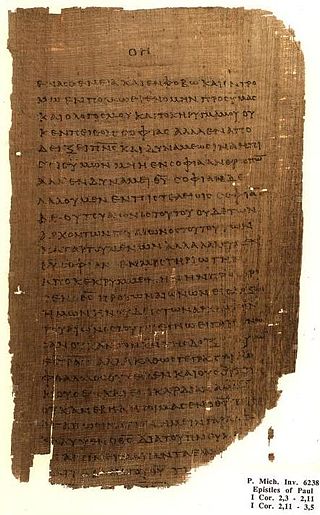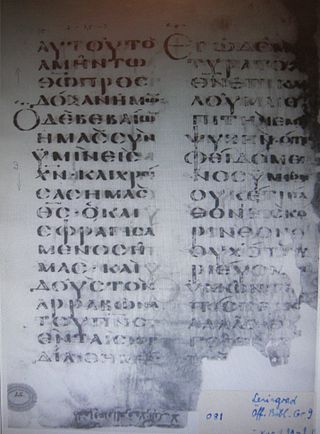John 16 is the sixteenth chapter of the Gospel of John in the New Testament of the Christian Bible. It records Jesus' continued farewell discourse to his disciples, set on the last night before his crucifixion. In this chapter, Jesus speaks about the work of the Holy Spirit, the joy of the believers and his victory over the world. The book containing this chapter is anonymous, but early Christian tradition uniformly affirmed that John composed this Gospel.

Acts 2 is the second chapter of the Acts of the Apostles in the New Testament of the Christian Bible. The book containing this chapter is anonymous but early Christian tradition asserted that Luke composed this book as well as the Gospel of Luke. This chapter records the events on the day of Pentecost, about 10 days after the ascension of Jesus Christ.
Romans 8 is the eighth chapter of the Epistle to the Romans in the New Testament of the Christian Bible. It was authored by Paul the Apostle, while he was in Corinth in the mid-50s AD, with the help of an amanuensis (secretary), Tertius, who added his own greeting in Romans 16:22. Chapter 8 concerns "the Christian's spiritual life".

Romans 12 is the twelfth chapter of the Epistle to the Romans in the New Testament of the Christian Bible. It is authored by Paul the Apostle, while he was in Corinth in the mid-50s AD, with the help of an amanuensis (secretary), Tertius, who adds his own greeting in Romans 16:22.

1 Corinthians 2 is the second chapter of the First Epistle to the Corinthians in the New Testament of the Christian Bible. It is authored by Paul the Apostle and Sosthenes in Ephesus, composed between 52–55 CE.

1 Corinthians 3 is the third chapter of the First Epistle to the Corinthians in the New Testament of the Christian Bible. It is authored by Paul the Apostle and Sosthenes in Ephesus, composed between 52–55 CE. In this chapter, Paul begins to deal with the issue of factionalism in the Corinthian church which is one of his main reasons for writing the letter.

2 Corinthians 1 is the first chapter of the Second Epistle to the Corinthians in the New Testament of the Christian Bible. It is authored by Paul the Apostle and Timothy in Macedonia in 55–56 CE.

2 Corinthians 2 is the second chapter of the Second Epistle to the Corinthians in the New Testament of the Christian Bible. It is authored by Paul the Apostle and Timothy in Macedonia in 55–56 CE.

2 Corinthians 3 is the third chapter of the Second Epistle to the Corinthians in the New Testament of the Christian Bible. It is authored by Paul the Apostle and Timothy in Macedonia in 55–56 AD/CE. Biblical commentator Heinrich Meyer emphasises that the use of the plural 'we' in 2 Corinthians 3:2 and 2 Corinthians 3:6 includes Timothy in the writing of the letter.

2 Corinthians 6 is the sixth chapter of the Second Epistle to the Corinthians in the New Testament of the Christian Bible. It is authored by Paul the Apostle and Timothy in Macedonia in 55–56 CE.

2 Corinthians 7 is the seventh chapter of the Second Epistle to the Corinthians in the New Testament of the Christian Bible. It is authored by Paul the Apostle and Timothy in Macedonia in 55–56 CE.

2 Corinthians 13 is the thirteenth and final chapter of the Second Epistle to the Corinthians in the New Testament of the Christian Bible. It is authored by Paul the Apostle and Timothy in Macedonia in 55–56 CE.

Galatians 4 is the fourth chapter of the Epistle to the Galatians in the New Testament of the Christian Bible. It is authored by Paul the Apostle for the churches in Galatia, written between 49 and 58 CE. This chapter contains one of Paul's richest statements in Christology.

Ephesians 1 is the first chapter of the Epistle to the Ephesians in the New Testament of the Christian Bible. Traditionally, it is believed to have been written by Apostle Paul while he was in prison in Rome, but more recently, it has been suggested that it was written between AD 80 and 100 by another writer using Paul's name and style. This chapter contains the greeting, followed by a section about "The Blessing of God" and Paul's prayer.

Ephesians 2 is the second chapter of the Epistle to the Ephesians in the New Testament of the Christian Bible. Traditionally, it is believed to have been written by Apostle Paul while he was in prison in Rome, but more recently it has been suggested that it was written between AD 80 and 100 by another writer using Paul's name and style.

Ephesians 3 is the third chapter of the Epistle to the Ephesians in the New Testament of the Christian Bible. Traditionally, it is believed to have been written by Apostle Paul while he was in prison in Rome, but more recently it has been suggested that it was written between AD 80 and 100 by another writer using Paul's name and style. This chapter is part of a long prayer of Paul, with the particular section about Paul's stewardship of the great divine mystery, the petition for Christ to dwell in the believers' heart, and a doxology.

Ephesians 4 is the fourth chapter of the Epistle to the Ephesians in the New Testament of the Christian Bible. Traditionally, it is believed to have been written by Apostle Paul while he was in prison in Rome, but more recently, it has been suggested that it was written between AD 80 and 100 by another writer using Paul's name and style. This chapter is a part of Paul's exhortation, with the particular section about the mutual interdependence of the Christians as the church and how they should live in the world (4:17–5:20).

1 Timothy 1 is the first chapter of the First Epistle to Timothy in the New Testament of the Christian Bible. The author has been traditionally identified as Paul the Apostle since as early as AD 180, although most modern scholars consider the letter pseudepigraphical, perhaps written as late as the first half of the second century AD.

1 Timothy 6 is the sixth and final chapter of the First Epistle to Timothy in the New Testament of the Christian Bible. The author has been traditionally identified as Paul the Apostle since as early as AD 180, although most modern scholars consider the letter pseudepigraphical, perhaps written as late as the first half of the second century AD.

2 Peter 3 is the third chapter of the Second Epistle of Peter in the New Testament of the Christian Bible. The author identifies himself as "Simon Peter, a bondservant and apostle of Jesus Christ". The epistle is traditionally attributed to Peter the Apostle, but some scholars consider it to be a work of Peter's followers, written between 60 and 90 CE.











